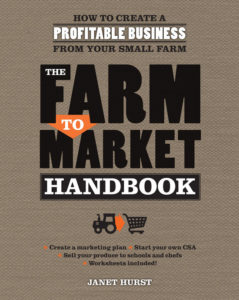Excerpted from The Farm to Market Handbook by Janet Hurst.
Brokers can assist the farmer in accessing a broad range of clients. They have made the inroads with chefs, restaurants, food suppliers, and other markets. Their business is to help you sell your products, for a fee. Some brokers add their fee on top of your asking price. More commonly, brokers ask for their going rate. If you have a glut of a particular item, then a broker can certainly be of help. However, chances are if you are up to your eyeballs in watermelon, others are too, so establish a relationship with a broker before the need arises.
Consider working a broker into your overall business plan. With a broker’s help, you will enter more markets and have a broader reach for your sales. Many brokers are situated in large metropolitan areas and source foods from neighboring countryside farms. This is a helpful service for those who do not wish to challenge the city or don’t know where to go once they get there. Brokers, indeed, can be helpful business partners. You will need to find out how the broker wants goods delivered. Bunched Packaged? Select? Work to fulfill the specifications. Some brokers purchase by the piece, others by the pound or case lot.
The broker services his or her clientele. Don’t forget your broker is the middleman, and if he looks good, you will, too. He is providing delivery service to multiple buyers, which takes valuable time. Remember, you are paying for those services.
You may also enjoy these excerpts from The Farmers Market Handbook:
This excerpt has been reprinted with permission from The Farm to Market Handbook by Janet Hurst and published by Voyager Press, 2014.











